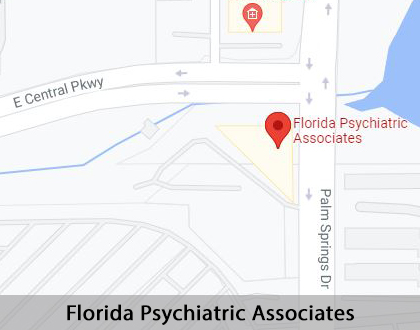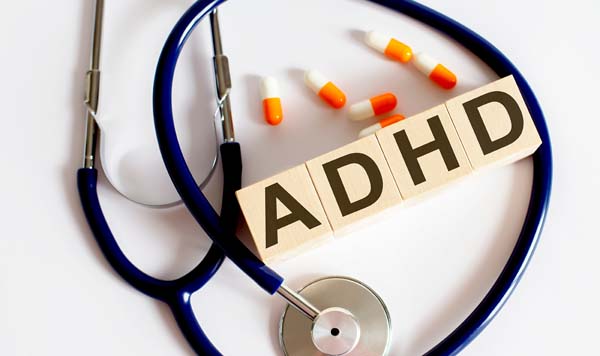Personality Disorder Treatment Altamonte Springs, FL
Personality disorder therapy and treatment offers people with various types of personality disorders a way to manage and cope with their symptoms. A personality disorder refers to a set of long-term behavior patterns that significantly impair a person’s ability to function in society. This often creates problems for them in all aspects of their lives, making them more vulnerable to mental illness and substance abuse. This deviation from society largely affects the person’s perception of themself and others, often resulting in distress or problems in relationships and interactions.
Personality disorder evaluation and medication treatment is available at Florida Psychiatric Associates in Altamonte Springs, FL. We can help diagnose and treat various types of personality disorders through Medication Management. However, patients are referred to Mental Health Counselors on their insurance plan for Psychotherapy. We do not offer Court Ordered Evaluations of any kind. Call us today at (407) 960-5633 to schedule an appointment or learn more about our services.
Types of Personality Disorders
Personality is what sets each individual apart from others. It comes from a mixture of experiences, environment, surroundings, situations, and inherited characteristics. According to the American Psychiatric Association, a personality disorder is "a way of thinking, feeling, and behaving that deviates from the expectations of the culture, causes distress or problems functioning, and lasts over time."
There are 10 different types of personality disorders that can be categorized under three clusters: suspicious, emotional or impulsive, and anxious.
- Cluster A – Suspicious: includes Paranoid personality disorder, Schizoid personality disorder, and Schizotypal personality disorder.
- Cluster B – Emotional or Impulsive: consists of Antisocial personality disorder (ASPD), Borderline personality disorder (BPD), Histrionic personality disorder, and Narcissistic personality disorder.
- Cluster C – Anxious: encompasses Avoidant personality disorder, Dependent personality disorder, and Obsessive-Compulsive Personality Disorder (OCPD).
Each type of personality disorder has its own set of causes, symptoms, and management and treatment. Individuals may have all the types under one cluster or a combination of types from each cluster (called mixed personality disorder). Managing and treating personality disorders requires an accurate diagnosis from all these types.
“There are 10 different types of personality disorders that can be categorized under three clusters: suspicious, emotional or impulsive, and anxious.”
Causes of Personality Disorder
Personality disorders are often caused by genetics, parenting styles, and peer influences. Modern research suggests that various factors such as abuse can also contribute to the development of these disorders, especially when they are inherent in an individual. The American Psychological Association lists the causes of personality disorders and their contributing factors:
- Genetics: A study in Molecular Psychiatry found that 6 out of 7 family members with a certain mutated gene had Obsessive-Compulsive Disorder (OCD) and multiple other disorders such as alcohol and substance abuse.
- Childhood Trauma: Researchers have found that many complicated or serious traumas that occur in childhood, such as sexual abuse, could severely impact a person with a personality disorder or largely contribute to its development.
- Verbal Abuse: Children who experienced emotionally abusive verbal language or threats from their parents were three times more likely to develop a personality disorder in adulthood.
- High Reactivity: Children who are overly sensitive to certain stimuli, such as light, noise, and textures, may be more susceptible to the development of a personality disorder.
- Peer influence: Relationships can affect the development of a personality disorder in either a positive or negative way.
“Personality disorders are often caused by genetics, parenting styles, and peer influences”
Diagnosing Personality Disorders
To properly diagnose a personality disorder, patients must go through a variety of tests and assessments. A primary care doctor may recommend a physical examination, laboratory tests, psychiatric evaluation, and running diagnostic criteria under the Diagnostic and Statistical Manual of Mental Disorders (DSM-5), published by the American Psychiatric Association. It is often difficult to diagnose patients with a particular personality disorder as many signs and symptoms overlap, and many people have a combination of various types of Personality Disorders.
The Mayo Clinic suggests that people experiencing long-term deviations from cultural expectations in themselves or loved ones may have one or more personality disorders. This long-term deviation can lead to significant effects or impairment in the following areas:
- Interpretation of the self and others
- Emotional reactions or responses
- Functioning in relationships
- Impulse control
In many cases, diagnosis and treatment require the aid of family members or close friends as the person may not be aware of or recognize the problem.
“This long-term deviation can lead to significant effects or impairment in the following areas: interpretation of the self and others, emotional reactions or responses, functioning in relationships, and impulse control.”
Check out what others are saying about our mental wellness on Yelp: Personality Disorder Therapy in Altamonte Springs, FL
Court Ordered Diagnoses
In some cases, the court may order individuals with personality disorders to attain a professional clinical evaluation and diagnosis. In these cases, more severe consequences may be resulting from the person’s behavior, such as abuse or violence. The court or a parent may request a Child Custody Evaluation or "730 Evaluation" in cases such as these to determine whether one or both parents are not equipped or capable of raising their child.
A 730 Evaluation may be required when there are concerns of child abuse, substance abuse, mental health problems, disagreements on relocation, questionable parenting practices, disagreement on a custodial arrangement, or questionable upbringing on either side. The court may also require other evaluations in times of dispute or when a doctor recommends assessment of a physical or mental health condition.
“In some cases, the court may order individuals with personality disorders to attain a professional, clinical evaluation and diagnosis.”
Questions Answered on This Page
Q. What are personality disorders?
Q. What causes personality disorders?
Q. How are personality disorders diagnosed?
Q. What are court-order diagnoses?
Q. What are the available treatments for personality disorder?
People Also Ask
Q. How are mood disorders diagnosed?
Treatments for Personality Disorders
As personality disorders are often difficult to measure or diagnose, a combination of treatments can help to address multiple factors. The American Psychiatric Association asserts that various forms of psychotherapy help patients understand their condition, how their behavior affects themselves and others, and how to manage their symptoms and keep them at bay. One or more forms of psychotherapy may be used to help manage or treat personality disorders, while more severe cases may require certain medications to work in conjunction with therapy.
Psychotherapies that can help treat personality disorders include Psychoanalytic/psychodynamic therapy, Dialectical behavior therapy, Cognitive behavioral therapy, Group therapy, and Psychoeducation. In psychoeducation, a therapist helps educate the individual and family members about their specific disorder and helps them develop ways of coping. People with personality disorders are often given self-care management strategies to work on at home coupled with therapy. These include education, physical activity, substance avoidance, routine medical care, support groups, journaling, stress management, and social circles.
“Psychotherapies that can help treat personality disorders include Psychoanalytic/psychodynamic therapy, Dialectical behavior therapy, Cognitive behavioral therapy, Group therapy, and Psychoeducation.”
Frequently Asked Questions
Q. Is personality disorder curable?
A. Although it is still unknown whether personality disorders can be completely cured, they have been known to decrease over time with proper treatment. Early intervention in childhood and adolescence can also yield great benefits in the reduction of symptoms in adulthood. Personality disorders may not be curable, but they are treatable and manageable.
Q. How common are personality disorders?
A. Personality disorders are among the most common disorders in the entire world, with an estimated 10 to 13 percent of the world’s population affected. These disorders most commonly begin developing in the teen years and are most commonly diagnosed after the age of 18.
Q. What is the most common type of personality disorder?
A. The most common personality disorder in the United States is Obsessive-compulsive disorder (OCD), followed by Narcissistic personality disorder, and then Borderline personality disorder. Prevalence may be due to the societal norms and expectations in the U.S. today. Commonality may differ in other countries.
Q. What is the most common treatment for personality disorder?
A. Psychotherapy is the most common way to treat personality disorders. There are various forms of psychotherapy, including Cognitive Behavioral Therapy (CBT), Dialectical Behavior Therapy (DBT), Interpersonal Therapy (IPT), and Family-Focused Therapy. The type of psychotherapy used depends on the patient’s case, severity, and symptoms.
Q. What are the different treatments available for personality disorders?
A. Along with psychotherapy, there are treatments that can be used in combination to help manage symptoms. Although there are no medications strictly for personality disorders, patients may be prescribed antidepressants, anti-anxiety, antipsychotic, or mood-stabilizing medications depending on their case to manage similar symptoms.
Change Is Possible – Call Us Today
Life isn’t always easy. Are you struggling? Are you looking for a highly personalized and professional approach tailored to your individual needs? Instead of waiting around, call us today. You should know that there is hope for a better tomorrow.
Definitions
- Electroconvulsive treatment
- Electroconvulsive treatment is a procedure commonly used to treat major depression that involves brief brain electrical stimulation.
- Major depressive disorder
- Major depressive disorder is a mood disorder during which the person suffers symptoms for 2 weeks or more. These symptoms include feeling sad and empty every day, losing interest in what one once enjoyed, feelings of worthlessness, thoughts of suicide, and trouble falling asleep or sleeping more than usual. The symptoms can be so severe they interfere with daily responsibilities.
Call Us Today
Do not ignore your depression and let it interfere with your life. Our team at Florida Psychiatric Associates offers customized depression treatment to help patients overcome their depression and live the lives they want. Call us today at 407-960-5633 to learn more about our services or schedule an appointment.
Helpful Related Links
- American Psychiatric Association (APA). Mental Health Topics. 2021
About our business, license, and website security
- Florida Psychiatric Associates was established in 2003.
- We accept the following payment methods: American Express, Cash, Discover, MasterCard, and Visa
- We serve patients from the following counties: Seminole County, Volusia County and Orange County
- We serve patients from the following cities: Altamonte Springs, Lake Mary, Sanford, Deltona, Orange City, DeBary, Apopka, Maitland, Winter Park and Orlando
- FL (License #ME68974). View License Information and Specifics
- National Provider Identifier Database (1518910835). View NPI Registry Information
- Norton Safe Web. View Details
- Trend Micro Site Safety Center. View Details







